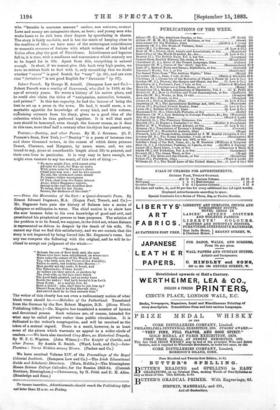PoEYRY. — Destiny, and other Poems. By M. J. Sevrano. (G. P.
Putnam's Sons, New York.)—" Destiny " is a poem of between two and three thousand verses, in the course of which three persons Ernest, Clarence, and Margaret, by name, muse, and, we are bound to say, prose at considerable length about life in general, and their own lives in particular. It is very easy to have enough, we might even venture to say too much, of this sort of thing :- " No more might Fate, with aspect grim Affright his soul; for Hope no more, With urea voice to Pleasure's shore Could lure him now ; and he who spreads No sail, the storm-test ocean dreads No longer—bitter recompense
Of Pain, that from the flames intense Alone, where Happiness expires, Spring in the soul the deathless fires To being, that for her illume, Serene, the darkness of the tomb."
—From the Mountains of the East : a Quasi-dramatic Poem. By -Ernest Edward Dagmore, M.A. (Kagan Paul, Trench, and Co.) Mr. Dagmore here puts the history of Balaam into a series of dialogues or soliloquies in verse. The chief motive is to show how the seer became false to his own knowledge of good and evil, and prostituted his prophetical powers to base purposes. The solution of the problem is to be found, we suppose, in the third act, where Balsam is represented as driven to despair by the death of his wife. We cannot say that we find this satisfactory, and we are certain that the story is not improved by being forced into Mr. Dagmore's verse. Let any one compare the following with the original, and he will be in- clined to accept our judgment of the whole :- " SALAAM.
" Balsam the eon of Beer bath said, the man Whose eyes have been enlightened, on whose ears Have come the echoes of the Words of God, Yea, who bath seen the Vision of the Almighty, Fallen to earth, but looking into Heaven :- How goodly are thy tents, 0 Jacob, and Thy Tabernacles, 0 thou 'areal I
As valleys are they spread, as gardens by The river side, as the lign aloes which The Lord hath planted, and as cedar trees Beside the waters I God hash brought him forth From Klypt. As a mighty lion, he Rath couched : who shall dare to stir him up ? Blessed from God is he that blesreth thee ; And cursed shall he be that oarseth thee."
The writer of this clearly has not even a rudimentary notion of what blank verse should be.—Melodies of the Fatherland. Translated from the German by the Rev. Robert Maguire, D.D. (Home Words Publishing Office.)—Dr. Maguire has translated a number of hymns and devotional poems. Such volumes are, of course, intended for what may be called private rather than public circulation. It is dedicated to the writer's congregation, and will be received as the token of a mutual regard. There is a merit, however, in at least some of the pieces which warrants an appeal to a wider circle of readers.—We have also received Cing-Mars, an Historical Tragedy. By W. R C. Wigston. (John Wilson.)—The knight of Castile, and other Poems. By Austin E. Smith. (Ward, Lock, and Co.)—Inter .Flumina : Verses Written among Rivers. (Parker and Co.)


































 Previous page
Previous page